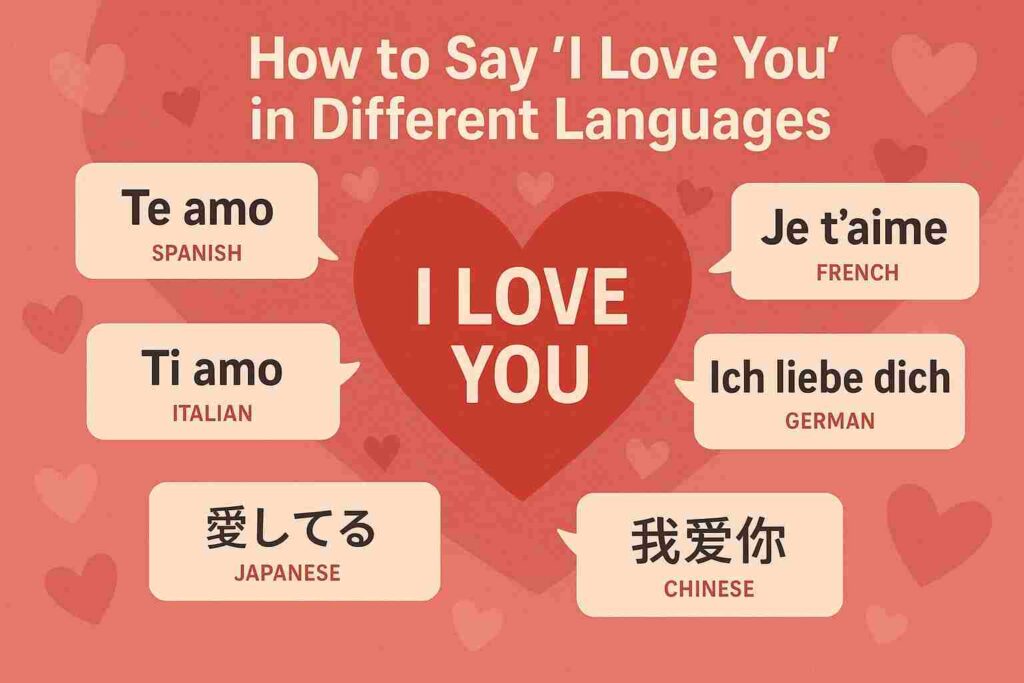Saying “I love you” is simple in your head but somehow tricky when it actually comes out of your mouth. Maybe you’re shy, maybe it’s in a different language, or maybe you just want to surprise someone. Either way, love doesn’t care about borders—it exists everywhere, and so does the phrase “I love you.”
I thought it would be fun to show you how people say it in 100 different languages. Some sound familiar, some might twist your tongue a bit, and some are just plain beautiful. I’ll keep the explanations short, so it’s easy to read and maybe even memorize a few.
European Languages
- English: I love you – Classic, simple.
- Spanish: Te quiero / Te amo – “Te quiero” is casual/friendly, “Te amo” is deeper.
- French: Je t’aime – Romantic and soft, sounds almost musical.
- Italian: Ti amo – Deeply romantic, usually for partners.
- German: Ich liebe dich – Straightforward, no-nonsense.
- Portuguese: Eu te amo – Like Spanish, sweet and strong.
- Dutch: Ik hou van jou – Feels friendly, warm.
- Swedish: Jag älskar dig – Soft “jag” at the start, playful to say.
- Norwegian: Jeg elsker deg – Almost the same as Swedish, different pronunciation.
- Danish: Jeg elsker dig – Very similar, just slightly different ending.
- Finnish: Rakastan sinua – Sounds smooth and unique.
- Russian: Я тебя люблю (Ya tebya lyublyu) – Romantic, a bit dramatic.
- Polish: Kocham cię – Short and sweet.
- Greek: Σ’ αγαπώ (S’agapo) – Smooth, almost like singing.
- Hungarian: Szeretlek – One word, compact and cute.
- Czech: Miluji tě – Strong and confident.
- Slovak: Ľúbim ťa – Light and playful sound.
- Romanian: Te iubesc – Flowy and soft.
Asian Languages
- Japanese: 愛してる (Aishiteru) – Deeply romantic, not said casually.
- Chinese (Mandarin): 我爱你 (Wǒ ài nǐ) – Simple, direct, and widely known.
- Chinese (Cantonese): 我愛你 (Ngóh oi néih) – Slightly different tone and pronunciation.
- Korean: 사랑해 (Saranghae) – Casual and sweet.
- Hindi: मैं तुमसे प्यार करता हूँ / करती हूँ (Main tumse pyaar karta/karti hoon) – Gender-specific endings, formal but tender.
- Bengali: আমি তোমায় ভালবাসি (Ami tomay bhalobashi) – Sounds soft and poetic.
- Urdu: میں تم سے محبت کرتا ہوں / کرتی ہوں (Main tumse mohabbat karta/karti hoon) – Rich and romantic.
- Thai: ฉันรักคุณ (Chan rak khun) – Gentle and polite.
- Vietnamese: Anh yêu em / Em yêu anh – Depends on gender of speaker and listener.
- Indonesian: Aku cinta kamu – Casual and warm.
- Malay: Saya cinta padamu – Polite and clear.
- Filipino / Tagalog: Mahal kita – Short, everyday, but heartfelt.
- Tamil: நான் உன்னை காதலிக்கிறேன் (Naan unnai kaadhalikkiren) – Strong and expressive.
- Telugu: నేను నిన్ను ప్రేమిస్తున్నాను (Nenu ninnu preminchanu) – Formal and loving.
- Gujarati: હું તને પ્રેમ કરું છું (Hu tane prem karu chu) – Sweet and gentle.
- Punjabi: ਮੈਂ ਤੈਨੂੰ ਪਿਆਰ ਕਰਦਾ / ਕਰਦੀ ਹਾਂ (Main tainu pyaar karda/kardi haan) – Warm, casual, and intimate.
Middle Eastern Languages
- Arabic: أحبك (Ahbak / Ahbik) – Gender matters, soft and flowing.
- Hebrew: אני אוהב אותך / אוהבת (Ani ohev / ohevet otach) – Gender-specific, lyrical.
- Persian / Farsi: دوستت دارم (Dooset daram) – Casual and widely used.
- Turkish: Seni seviyorum – Friendly, easy to say.
African Languages
- Swahili: Nakupenda – Simple, friendly, and musical.
- Zulu: Ngiyakuthanda – Long but beautiful.
- Xhosa: Ndiyakuthanda – Similar to Zulu, soft to pronounce.
- Hausa: Ina son ku – Polite and warm.
- Amharic: እወድሃለሁ (Ewedihalehu) – Sounds almost like a chant, melodic.
Americas & Caribbean Languages
- Quechua: Kuyayki – Short and sweet.
- Navajo: Ayóó anííníshní – Complex but meaningful.
- Haitian Creole: Mwen renmen ou – Casual and easy.
- Guarani: Rohayhu – Small, cute, and direct.
- Maya (Yucatec): In k’áatech – Unique and cultural.
Oceania & Pacific Languages
- Maori: Aroha ahau ki a koe – Warm and flowing.
- Samoan: Ou te alofa ia te oe – Casual and heartfelt.
- Tongan: Oku ou ‘ofa atu – Soft and musical.
- Fijian: Au domoni iko – Friendly, simple.
Other Languages Around the World
- Esperanto: Mi amas vin – Short, universal, easy to remember.
- Icelandic: Ég elska þig – Strong, clear pronunciation.
- Maltese: Inhobbok – Compact and sweet.
- Irish / Gaelic: Taim i’ ngra leat – Romantic and lyrical.
- Scottish Gaelic: Tha gaol agam ort – Feels like poetry.
- Welsh: ‘Rwy’n dy garu di – Melodic, fun to say.
- Basque: Maite zaitut – Short, soft, and simple.
- Catalan: T’estimo – Smooth and gentle.
- Punjabi (India): ਮੈਂ ਤੈਨੂੰ ਪਿਆਰ ਕਰਦਾ ਹਾਂ (Main tainu pyaar karda) – Everyday, warm.
- Burmese: မင်းကိုချစ်တယ် (Min ko chit tal) – Gentle and direct.
Final Words
No matter where you go, love sounds beautiful. The words change, the sounds change, but the feeling stays the same. Some languages make it flow like a song, some make it short and punchy, and some feel like poetry.
If you’re learning a few for fun, try practicing pronunciation—it’s kind of fun to see which languages you can say naturally. And honestly, saying “I love you” in someone else’s language can be a small but powerful gesture.
Also read:




